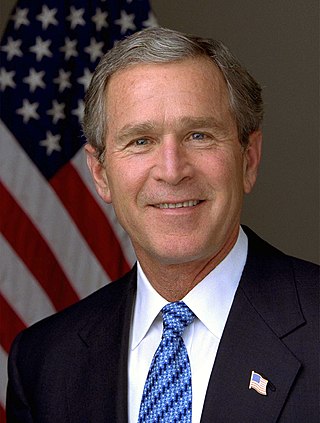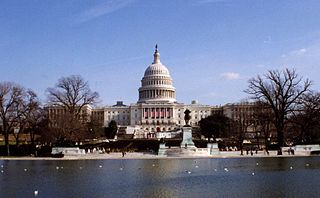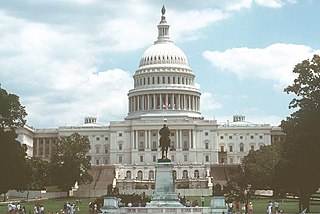
George W. Bush's tenure as the 43rd president of the United States began with his first inauguration on January 20, 2001, and ended on January 20, 2009. Bush, a Republican from Texas, took office following a narrow victory over Democratic incumbent vice president Al Gore in the 2000 presidential election. Four years later, in the 2004 presidential election, he defeated Democrat nominee John Kerry to win re-election. Bush was succeeded by Democrat Barack Obama, who won the 2008 presidential election.

John David Dingell Jr. was an American politician who served as a member of the United States House of Representatives from 1955 until 2015. A member of the Democratic Party, he holds the record for longest-serving member of Congress in American history, representing Michigan for more than 59 years. He most recently served as the representative for Michigan's 12th congressional district. A longtime member of the House Energy and Commerce Committee, Dingell was the chairman of the committee from 1981 to 1995 and 2007 to 2009.

The 108th United States Congress was a meeting of the legislative branch of the United States federal government, composed of the United States Senate and the United States House of Representatives from January 3, 2003 to January 3, 2005, during the third and fourth years of George W. Bush's presidency.

The 103rd United States Congress was a meeting of the legislative branch of the United States federal government, composed of the United States Senate and the United States House of Representatives. It met in Washington, D.C. from January 3, 1993, to January 3, 1995, during the final weeks of George H. W. Bush's presidency and in the first two years of Bill Clinton's presidency. The apportionment of seats in the House of Representatives was based on the 1990 United States census.

The 102nd United States Congress was a meeting of the legislative branch of the United States federal government, composed of the United States Senate and the United States House of Representatives. It met in Washington, D.C., from January 3, 1991, to January 3, 1993, during the last two years of George H. W. Bush's presidency. This is the most recent Congress where Republicans held a Senate seat from California.

The 101st United States Congress was a meeting of the legislative branch of the United States federal government, composed of the United States Senate and the United States House of Representatives. It met in Washington, D.C., from January 3, 1989, to January 3, 1991, during the final weeks of Ronald Reagan's presidency and the first two years of George H. W. Bush's presidency.

The 100th United States Congress was a meeting of the legislative branch of the United States federal government, composed of the United States Senate and the United States House of Representatives. It met in Washington, D.C., from January 3, 1987, to January 3, 1989, during the last two years of Ronald Reagan's presidency. The apportionment of seats in the House of Representatives was based on the 1980 United States census.

The 99th United States Congress was a meeting of the legislative branch of the United States federal government, composed of the United States Senate and the United States House of Representatives. It met in Washington, D.C., from January 3, 1985, to January 3, 1987, during the fifth and sixth years of Ronald Reagan's presidency. The apportionment of seats in the House of Representatives was based on the 1980 United States census.

John James Conyers Jr. was an American politician of the Democratic Party who served as a U.S. representative from Michigan from 1965 to 2017. The districts he represented always included part of western Detroit. During his final three terms, his district included many of Detroit's western suburbs, as well as a large portion of the Downriver area.

Bennie Gordon Thompson is an American politician serving as the U.S. representative for Mississippi's 2nd congressional district since 1993. A member of the Democratic Party, Thompson served as the chair of the Committee on Homeland Security from 2019 to 2023 and from 2007 to 2011. He was both the first Democrat and the first African American to chair the committee. He is the dean of Mississippi's congressional delegation.

The U.S. House Committee on the Judiciary, also called the House Judiciary Committee, is a standing committee of the United States House of Representatives. It is charged with overseeing the administration of justice within the federal courts, federal administrative agencies, and federal law enforcement entities. The Judiciary Committee is often involved in the impeachment process against federal officials. Because of the legal nature of its oversight, committee members usually have a legal background, but this is not required.

The 98th United States Congress was a meeting of the legislative branch of the United States federal government, composed of the United States Senate and the United States House of Representatives. It met in Washington, D.C., from January 3, 1983, to January 3, 1985, during the third and fourth years of Ronald Reagan's presidency. The apportionment of seats in the House of Representatives was based on the 1980 U.S. census.

The 97th United States Congress was a meeting of the legislative branch of the United States federal government, composed of the United States Senate and the United States House of Representatives. It met in Washington, D.C., from January 3, 1981, to January 3, 1983, during the final weeks of Jimmy Carter's presidency and the first two years of Ronald Reagan's presidency. The apportionment of seats in the House of Representatives was based on the 1970 United States census.

During the presidency of George W. Bush, several American politicians sought to either investigate Bush for possible impeachable offenses, or to bring actual impeachment charges on the floor of the United States House of Representatives Judiciary Committee. The most significant of these efforts occurred on June 10, 2008, when Congressman Dennis Kucinich, along with co-sponsor Robert Wexler, introduced 35 articles of impeachment against Bush to the U.S. House of Representatives. The House voted 251 to 166 to refer the impeachment resolution to the Judiciary Committee on June 11, where no further action was taken on it. Bush's presidency ended on January 20, 2009, with the completion of his second term in office, rendering impeachment efforts moot.
John C. Bonifaz is an Amherst-based attorney and political activist specializing in constitutional law and voting rights. He is the president and co-founder of Free Speech for People. He is also the founder of the National Voting Rights Institute and a former candidate for Massachusetts Secretary of the Commonwealth. In 1999, he received a MacArthur Fellowship, popularly known as the "genius award."

The 109th United States Congress was a meeting of the legislative branch of the United States federal government, composed of the United States Senate and the United States House of Representatives, from January 3, 2005, to January 3, 2007, during the fifth and sixth years of George W. Bush's presidency. House members were elected in the 2004 elections on November 2, 2004. Senators were elected in three classes in the 2000 elections on November 7, 2000, 2002 elections on November 5, 2002, or 2004 elections on November 2, 2004. The apportionment of seats in the House of Representatives was based on the 2000 United States census.

George Walker Bush is an American politician who was the 43rd president of the United States from 2001 to 2009. A member of the Republican Party, he previously served as the 46th governor of Texas from 1995 to 2000.
The Deficit Reduction Act of 2005 is a United States Act of Congress concerning the federal budget that became law in 2006.

George William Crockett Jr. was an African-American attorney, jurist, and congressman from the U.S. state of Michigan. He also served as a national vice-president of the National Lawyers Guild and co-founded what is believed to be the first racially integrated law firm in the United States.

Stephen Joseph Murphy III is a United States district judge of the United States District Court for the Eastern District of Michigan.













